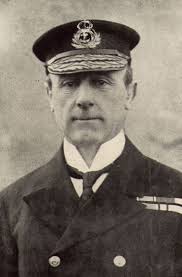Get Today in Masonic History into your Inbox. Sign up today for one of our email lists!
Need an article for your Trestleboard/Newsletter see our Use Policy
John Jellicoe, 1st Earl Jellicoe is Born

Today in Masonic History John Jellicoe, 1st Earl Jellicoe is born in 1859.
John Jellicoe, 1st Earl Jellicoe was a British Admiral.
Jellicoe was born on December 5th, 1859 in Southhampton, Hampshire, England. He was educated at the Field House School in Rottingdean. At the age of 13, he joined the Royal Navy and was assigned as a cadet on board the HMS Britania.
Starting in 1874, Jellicoe was assigned as a midshipman on board the HMS Newcastle in the Mediterranean fleet. He served on a variety of ships in the Mediterranean fleet as he moved up in rank. During the Egyptian War, he was in charge of a rifle company in Ismailia, Egypt.
In 1883, Jellicoe qualified as a gunnery officer and the following year he was assigned to gunnery school on board the HMS Excellent.
In 1905, Jellicoe became the Director of Naval Ordnance. By this time he had been promoted to the rank of Captain. He had also been assigned command of various sea going commands.
On March 8th, 1906, Jellicoe was made an Aide-De-Camp to King Edward VII. He continued as Aide-De-Camp until the passing of King Edward VII in 1910. During this time he worked to improve technology in the Royal Navy. Specifically he pushed for a "Fire Control Table." It was a mechanical computer that could calculate firing solutions for warships. He also made Third Sea Lord and Controller of the Navy after being promoted to Rear-Admiral in 1907. After the passing of King Edward VII he was promoted again to Vice-Admiral and made Second Sea Lord in 1912.
In 1914, Jellicoe was promoted to full Admiral. He then was assigned the command of the Grand Fleet. A fleet of ships that was created specifically for World War I. When the First Sea Lord and the First Lord of the Admiralty (Winston Churchill) came into a conflict which resulted in both men being removed from their positions, Jellicoe took up sides in the matter coming down on the side of the First Sea Lord. This began a long standing issue between Jellicoe and Churchill. As the commander of the Grand Fleet, there were no major issues, although there were also no major victories, which was upsetting to the British public. Some historians say that Jellicoe was not aggressive enough, others blame actions of subordinate officers. Regardless of which is correct, Jellicoe was promoted to First Sea Lord in 1916.
As First Sea Lord, Jellicoe was faced with the serious U-Boat issue that was essentially starving Britain. Jellicoe had been First Sea Lord for only a month when Lloyd George became Prime Minister. From the start he was encouraged, mostly for political reasons, to remove Jellicoe as First Sea Lord. After several starts and stops in the process of removing, again mostly due to politics, Lloyd George sent him a letter asking him for resignation in December 1917. Jellicoe at first was going to refuse, then decided it was in the best interest of the Royal Navy.
In 1919, Jellicoe was promoted to the rank of Admiral of the Fleet, which is the highest rank in the Royal Navy. A year later, in 1920 he was made Governor-General of New Zealand.
Jellicoe passed away from pneumonia on November 20th, 1935.
While serving as Governor-General of New Zealand, Jellicoe also served as Grand Master of the Grand Lodge of New Zealand.
This article provided by Brother Eric C. Steele.

